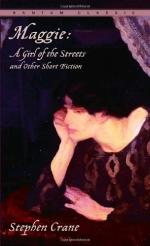In the hero’s erratic march from poverty in the first act, to wealth and triumph in the final one, in which he forgives all the enemies that he has left, he was assisted by the gallery, which applauded his generous and noble sentiments and confounded the speeches of his opponents by making irrelevant but very sharp remarks. Those actors who were cursed with villainy parts were confronted at every turn by the gallery. If one of them rendered lines containing the most subtile distinctions between right and wrong, the gallery was immediately aware if the actor meant wickedness, and denounced him accordingly.
The last act was a triumph for the hero, poor and of the masses, the representative of the audience, over the villain and the rich man, his pockets stuffed with bonds, his heart packed with tyrannical purposes, imperturbable amid suffering.
Maggie always departed with raised spirits from the showing places of the melodrama. She rejoiced at the way in which the poor and virtuous eventually surmounted the wealthy and wicked. The theatre made her think. She wondered if the culture and refinement she had seen imitated, perhaps grotesquely, by the heroine on the stage, could be acquired by a girl who lived in a tenement house and worked in a shirt factory.
Chapter IX
A group of urchins were intent upon the side door of a saloon. Expectancy gleamed from their eyes. They were twisting their fingers in excitement.
“Here she comes,” yelled one of them suddenly.
The group of urchins burst instantly asunder and its individual fragments were spread in a wide, respectable half circle about the point of interest. The saloon door opened with a crash, and the figure of a woman appeared upon the threshold. Her grey hair fell in knotted masses about her shoulders. Her face was crimsoned and wet with perspiration. Her eyes had a rolling glare.
“Not a damn cent more of me money will yehs ever get, not a damn cent. I spent me money here fer t’ree years an’ now yehs tells me yeh’ll sell me no more stuff! T’hell wid yeh, Johnnie Murckre! ‘Disturbance’? Disturbance be damned! T’hell wid yeh, Johnnie—”
The door received a kick of exasperation from within and the woman lurched heavily out on the sidewalk.
The gamins in the half-circle became violently agitated. They began to dance about and hoot and yell and jeer. Wide dirty grins spread over each face.
The woman made a furious dash at a particularly outrageous cluster of little boys. They laughed delightedly and scampered off a short distance, calling out over their shoulders to her. She stood tottering on the curb-stone and thundered at them.
“Yeh devil’s kids,” she howled, shaking red fists. The little boys whooped in glee. As she started up the street they fell in behind and marched uproariously. Occasionally she wheeled about and made charges on them. They ran nimbly out of reach and taunted her.




